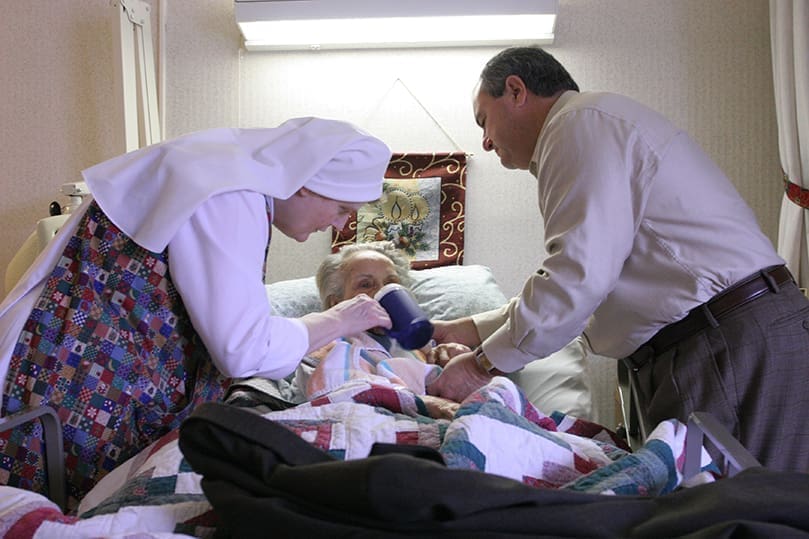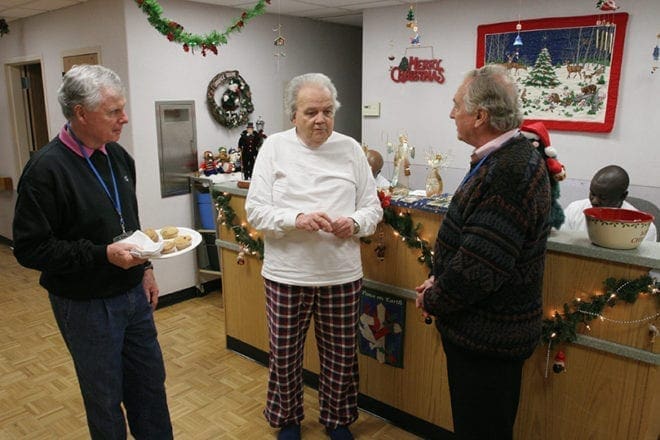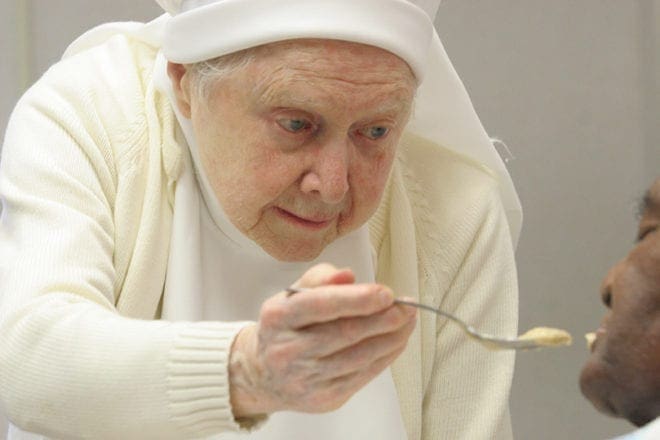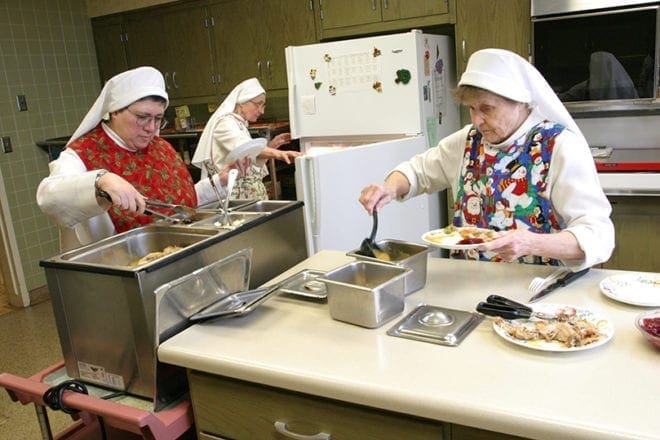 Photo By Michael Alexander
Photo By Michael AlexanderAtlanta
Compassion Toward Sick, Dying Is Vocation Of Love
By GRETCHEN KEISER, Staff Writer | Published January 7, 2010
The Hawthorne Dominican sisters dressed in white habits with black veils and rosaries draped at the waist gather for Mass at 6:30 a.m. in the chapel at the home where they care for terminally ill patients with cancer.
Their chaplain, Father Joseph Mullakkara, MSFS, reflects on the Scriptures of the day, the parable of two sons: one said “yes” but did not follow through on his promise to do what his father asked; one said “no” but later changed his mind and did what the father asked of him. How human, the chaplain says.
“Coming to God is a gradual process,” he says. “To say yes, we must be humble.”
It is not hard to think of Rose Hawthorne, who founded the sisters’ order. Her radical commitment to God in midlife changed her prominent birthright to a life of humble service, which, a century later, brightly reflects God’s love for the suffering sick.
The light oak-wood chapel is the center of life in Our Lady of Perpetual Help Home. It is right off the lobby as you enter. Even on the second floor, a balcony lets patients or caregivers step into the peaceful place where the sisters pray several times a day.
Following Mass, Father Mullakkara goes from room to room and gives each patient a blessing. Those who are Catholic receive the Eucharist. But those who are at the home are mainly not Catholic. On the woman’s floor, a veiled Muslim kneels on her bed in prayer several times each day, facing east.
Entering a room on the men’s floor, the priest gives Communion to one patient and blesses the man in the next bed. A large lighted Christmas tree and Nativity scene sparkle in the early morning darkness in each room as Sister Miriam, the superior, walks with the priest and greets each patient.
“They take excellent care of us,” one says spontaneously.
For the sisters the Eucharist is what gives them the strength to care for the patients as if each is Jesus.
Beginning the day with Mass “is what takes us through,” Sister Miriam says.
The Blessed Sacrament is placed on the altar again at 10:30 a.m. for an hour and the sisters go in and out for prayer as they can while nursing. At
4 p.m. they have a holy hour before the Blessed Sacrament and later return for night prayer.
“That is our life,” she says.
The ministry is to those of all faiths and those of no faith. At the turn of the twentieth century, Rose Hawthorne Lathrop, whose marriage had ended and who lost her young son to diphtheria, was moved to devote her life to caring for those suffering from terminal cancer. At the time cancer was thought to be contagious. In New York, hospitals put those with cancer out when it was learned they were incurably ill. Those with no means ended up dying in the poorhouse on Blackwell’s Island. The daughter of literary giant Nathaniel Hawthorne and a convert to Catholicism, she took a cancer-nursing course in her 40s and began to care for cancer-stricken poor in New York tenements, accepting no money from them and begging for aid in Fifth Avenue parlors of the wealthy and in appeals in the New York Times. Mark Twain was one of those who helped her.
Later joined in her nursing work by Alice Huber, an art student, they were eventually granted recognition as part of the Dominican order. The preaching of this new order was not to be through words but in their loving care of the sick poor.
The sisters take a vow of poverty, and the homes accept no payment from patients, from their families, from insurance or from government.
At the same time, as Sister Mary Edwin, the nursing director at Our Lady of Perpetual Help, says, “We have the vow of poverty. (The patients) have the best of everything.”
“I don’t think people come here expecting to see such a happy place,” she says. “This is a very joyful place.”

Our Lady of Perpetual Help Home volunteers Paul Gale of St. Brigid Church, Alpharetta, left, and Al Schmerge of St. Peter Chanel Church, Rowell, right, converse with patient William Bratcher in front of the first floor nurse’s station. Photo By Michael Alexander
“We must make our guests glad they crossed the threshold that is to be their last boundary. We must make them as comfortable and happy as if their own people had kept them and put them into the very best bedroom. We must love them,” Rose Hawthorne, whose religious name was Mother Alphonsa, said.
“If our Lord knocked at the door we would not be ashamed to show what we have done,” say her words posted in a hallway.
Motoring himself by electric wheelchair around the men’s floor, Elijah Mitchell, 65, says he decided it was wise to come to Atlanta from Minneapolis to be near his two sons as his health deteriorated. He lived in an apartment until doctors said it was no longer prudent. He came to Our Lady of Perpetual Help Home sight unseen.
“I consider myself blessed to be here, knowing my condition and being fully aware of what’s ahead for me—what’s in store,” he says.
“I think the world of this place.”
The Mississippi native and 30-year worker in radio speaks candidly about death approaching and how the sisters and staff help him.
“Here they try to make it as comfortable for me as possible to be able to withstand those last few days or however many days I have,” he says.
“The spiritual aspect makes it even easier to deal with. The surroundings are spiritual. We have devotions. We get a blessing from the priest on a daily basis and that is really wonderful. Although I am not a Catholic, I grew up with some Catholics around me, which makes it easy for me to understand what they are doing. “
“I have heard some bad stories about nursing homes. … There’s no comparison. They do a wonderful job. “
He would rather win a cure for the cancer he is suffering than win the lottery, he says. But he is comforted in the home.
“Being in here makes it easier to accept. There’s a lot of pain that goes along with my illness. They have a good pain management setup, but there’s only so much you can do. I guess that is the time when you have to depend on your spirituality,” Mitchell says.
Portraits of Rose Hawthorne and Alice Huber hang in the hallway as Sister Miriam continues her visits from room to room.
“They were women way ahead of their time. They had great vision from the Lord,” she says.
“(Mother Alphonsa) was taking cancer patients into her home” in 1900, an approach that is like today’s hospice movement, she says.
Sister Mary Edwin says, “I thank God every day” that Mother Alphonsa “was so far ahead of her time in making this an act of perfect charity.”
“If we started taking money, we would start taking people who pay” rather than those who are most in need. “We don’t think about money,” she says.
Every cost has been covered by donations since 1939 when the home opened, Sister Mary Edwin says. “The people of Atlanta have been very good to us.”
Wearing colorful aprons over their habits, bright blue or green dotted with holly or snowmen, the sisters busily talk and bring breakfast trays to the patients. Their voices are light and happy.
Later an Atlanta concert band plays Christmas music on the floors. Archbishop Wilton D. Gregory celebrated Mass there Dec. 8 and saw all the patients, and students from Pinecrest Academy and nurses from a Filipino nursing association were recent visitors.
In a day room on the women’s floor a large birdcage is alive with finches. Outside a large tree shades a deck and grassy yard where patients can keep a garden plot if they like. The cheers of Turner Field are audible in baseball season. You can almost touch the stadium from the home, and the sisters are good friends with the Braves.
All the sisters have some degree of nursing training. Some are registered nurses, others licensed practical nurses or certified nursing aides. A lay nursing staff and other workers supplement what the sisters do. A medical doctor visits weekly and also consults with the nursing staff daily by phone.
Sister Damien, who was working as an LPN on the oncology unit of a Columbus, Ohio, hospital before entering the order, describes how she approaches care of the sick.
“(Jesus) becomes our patient. We become the servants of Jesus. Whatever we are doing, we are doing for Jesus.“
“I lost an older brother and sister to cancer,” she says. “He calls us to follow the Gospel in caring for the sick. It is not easy to watch a loved one suffer. Jesus becomes a part of our suffering. He is here with us. Mary is at our side.”
“When we care for the sick, we do it in his name. We are the instruments of his love.”
“To me, it is a tremendous gift, this vocation. Everyone we touch takes a small part of him with them.”
“We journey together,” she says, the sick and their families and those who care for them, journeying together toward their common home in heaven.
While working at the hospital she saw an emphasis on the physical needs of the sick, “keeping them out of pain, making them comfortable.” Now she is grateful to help the dying and their families prepare spiritually as well.
“When it comes to speaking of the Lord, preparing them for eternity, we bring them hope for what lies ahead. So many people fear that moment, but Jesus tells us, ‘do not be afraid. I have prepared a place for you.’”
Claude Nardy, whose mother, Marie, was being cared for by Sister Damien says the experience has been deeply meaningful and consoling to his mother.
“The loving care she receives here is beyond what I ever thought it could be,” he says, sitting near his mother’s bed.

Eighty-nine-year-old Hawthorne Dominican Sister Mary Ellen feeds patient Mitchell Drewery his lunch. Photo By Michael Alexander
“One thing I first noticed when I came in here, and I still do, you feel the love and the spirituality and the prayers. … It is a loving feeling, a peaceful feeling and a soothing feeling. As I watch what the sisters do, it is a part of heaven. They are unselfish. Her level of care here is just unsurpassed. It is just wonderful. … My mother has been Catholic all her life. For her to be here with the sisters at the end of her life means a lot to her and to our family.”
He notices that everyone is treated with dignity and respect. The family is kept well informed medically. There’s also a desire to listen and give the sick what will comfort them, he says.
He smiles and remembers one day “mom wanted a glass of wine. They looked around and came in with two bottles—one red and one white. … They asked her, which one do you want? She looked at the white. They gave her a little bit, put it to her lips. That was all she wanted.”
“When you watch day in and day out, Sister Damien, who takes care of my mother, she’s an angel. Their whole lives are devoted to people who are dying, to cancer patients. They do it with such love. I don’t know any other place she could get the care.”
Sister Mary Edwin first wanted to be a nun and then discovered that she loved nursing. The Hawthorne Dominicans seemed a perfect fit for this 18-year-old in 1964.
In over 40 years in the order, she has served in their homes in New York, Massachusetts and Pennsylvania and earned an RN and a bachelor of science in nursing before becoming an administrator of one of the homes.
The “vocation is first,” she says. “The prayer life grounds you.”
“We are praying for the patients in the chapel and then we are coming back to the patients.”
She paraphrases a quotation about their order, that Jesus is present in their homes in the Blessed Sacrament and Jesus is present “covered with wounds in the halls of the sick.”
“You have Christ in the chapel and you have Christ in the beds,” she says.
She observes that sickness is “a great leveler.”
“We have homeless people next to people with a family. When you are sick, it doesn’t make any difference.”
In November 14 people died. Most who come to the home are there less than three months, but several have been there a year or more. Many are homeless people and the home at times provides for the burial also because there is no one else to give the person this last dignity. The sisters also try to help people get in touch with their families.
“There are many people who have been distant from their families for many reasons,” she says.
Being with those who are dying is “special every time.”

(Clockwise, from left) Hawthorne Dominican Sisters Mary Augustine, Mary Martha and Mary Kateri help make lunch preparations for the second floor patients. The patients on the second floor are female and the patients on the first floor are male. Photo By Michael Alexander
“I think—they are looking at me and they will be looking at God next. … One woman had 27 people around her bed. It was the most beautiful thing, all praying and saying, yes, mom, you are going to Jesus.”
Sister Mary Kateri, who has served in the order for about 20 years, says, “It is like taking care of the broken body of Christ.”
“A lot of times when these patients are dying, or even before, you know that Christ is there. It is something you don’t put in your thoughts. It happens.”
Sister Mary Ellen, who is 89 and retired, comes over from the convent on her walker to feed patients at mealtimes. Before entering the order she was a bicycle mechanic in Bayside, N.Y., at her father’s shop.
“I try to keep moving and doing what I can,” she says. “I pray for the different people. … It is all in God’s hands. He wakes me up at a certain time even before the alarm clock goes off. I get up and get the day going. The prayers are the most important.”
Al Schmerge, a volunteer there for 13 years, said when he and his family moved to Georgia in 1996, he ended up at Our Lady of Perpetual Help by following the wisdom of Protestant minister Henry Blackaby, who wrote, “If you want to find God or get closer to God, go to where he is already working and find him there.”
“I really see the Lord in the nuns. I see him in the nurses, and I see him in the patients,” said Schmerge, a businessman. “If you look in their eyes, you see the Lord in their eyes, or what I envision Christ in their eyes.”
The St. Peter Chanel parishioner goes to the home every Friday to do errands for patients, talk to them and listen to them, pray with them if they wish and, when they are well enough, to lead a Bible study.
“Many of these people were homeless before they came in. Many are estranged from their families. They need somebody to talk to. They really need someone to listen to them,” Schmerge said. “I try to treat them the same way the nuns and staff do. The nuns treat them like they are kings and queens. … I try to treat them as if they are the Lord.”
The nuns’ “selfless giving, day after day after day, their model of gentleness” softens people, he said. Paradoxically maybe, he says the sisters live a very joyful life and it’s contagious.
Many who enter the home “have never had people be kind to them. … Many are hard and bitter. When they come in, they think they are taking advantage of the nuns and their kindness. Gradually it gets to them, and they just soften up. You just see such a dramatic change in the patients. They are treated with dignity and respect.”
“People are really coming to grips with the fact that they are dying and they are going to meet their maker. …. We often witness people … talk about seeing their mother or seeing a dead relative. … Often they will see angels. They really stop focusing on this world. They go off into a different world. It really gives me a lot of faith in life after death or the realness of this just being a transition,” he says.
He thinks that the message in Matthew 25 is meant to send followers of Christ to hurting people because it is there that they can love and serve God himself in this world.
“When God put us on this earth, he put us on this earth to treat each other with the same dignity. We are all made in his image. I think he wants us to treat others just as we would treat him,” Schmerge says.
“I think the work we do like that is really the most pleasing work we do for God.”
For information visit www.olphhome.org